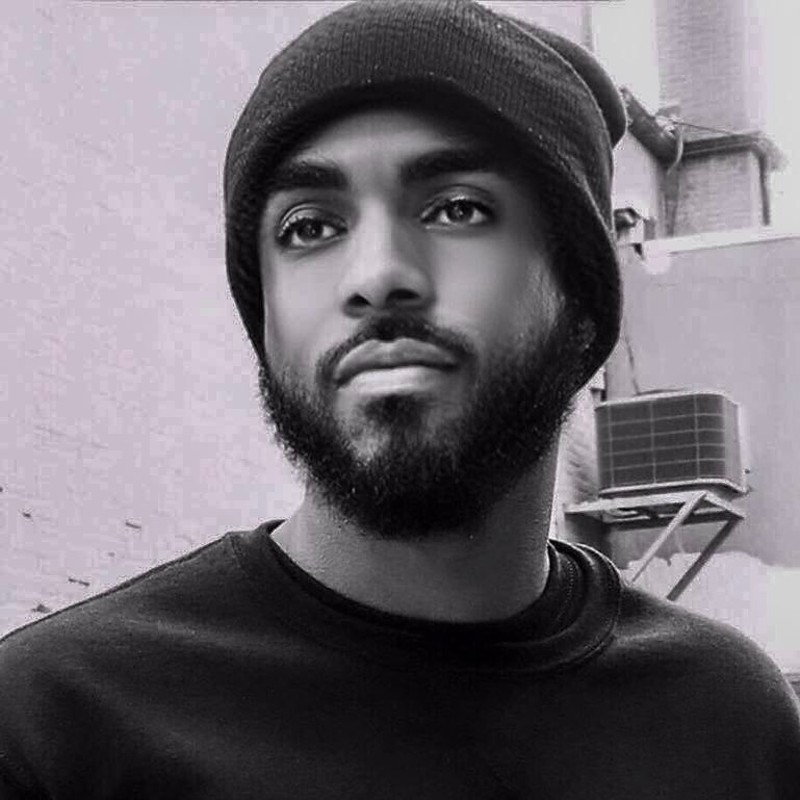Made for $3,000, St. Louis Filmmaker David Kirkman's Static Is Opening Doors
[
{
"name": "GPT - Leaderboard - Inline - Content",
"component": "41932919",
"insertPoint": "5th",
"startingPoint": "3",
"requiredCountToDisplay": "3",
"maxInsertions": 100
}
]
When David Kirkman first began filming Static in December 2017, his idea was to make a ten-minute short. But after reviewing the footage with cinematographer Michael Parks, they both agreed — ten minutes wasn't enough.
"We've got to go all the way with it," Kirkman realized.
The 24-year-old director, who was raised in Ferguson and is currently based in St. Louis city, ended up turning Static into a 44-minute film, one that's earned more than 750,000 views on YouTube, a place at an Afro-futurism conference in Berlin and a screening at a black history month event at Netflix headquarters in Silicon Valley. Last June, it won the Gentleman Jack "Reel to Reel" local competition, which highlights up-and-coming black filmmakers and diverse voices.
A "fan film" based on the Milestone Media/DC Comics character "Static Shock," Static tells the story of high school student Virgil Hawkins. Played by Maalik Shakoor, Hawkins "struggles with finding his place in the world and his new-found superpowers" as his dad runs for mayor, according to the YouTube description.
Electric Response
Shakoor, who grew up watching the animated television series, says he felt a lot of pressure portraying Static, but that the response shows the cast and crew are affecting people in a positive way.
"A little extra pressure because Static is such a beloved body of work and there's a lot of fans of the animated series who probably want to see it done justice," he says.
Kirkman credits the Reel to Reel competition, his film's first public screening, with validating his project to both the public and artistic community. Gentleman Jack is national organization partners with Codeblack Entertainment, a self-described "leading producer and distributor of urban and pop culture entertainment," which gave his film more exposure.
A former film production major who dropped out of Webster University during his junior year, Kirkman says public perception of the film was an initial barrier. Some people questioned why he was making a fan film — something he'd been talking about doing for years. And he and Parks, who had never dealt with visual effects, had to learn.
Funding was another issue. Scraping together the $3,000 budget as he went along, Kirkman relied on GoFundMe, investments from the crew and his own personal speaking fees.
But it all paid off.
Static's free showing at the Tivoli last September sold out in a day. Shortly after that, Kirkman went to Dallas for two screenings — also sold out. A few weeks later, he and some cast members were in Germany—his first time across seas. Black Entertainment Television even tweeted at his page. And Jared Jordan, a senior engineering manager at Netflix, messaged Kirkman on Instagram, inviting him and two guests (Parks and actor Bruce Carlton Cunningham, Jr., who plays the mayor of Dakota City) to one of Netflix's Black History Month events. There, Static was screened as part of a showcase of independent black artists.
"I didn't even know it was an employee from Netflix until they gave me their email address," Kirkman says. "We were on Cloud 11 for a whole month."
While the film has taken him all over, it is, oddly, most popular in Brazil. More than half of its views on YouTube come from the South American country. After Static's trailer was released last May, a Brazilian man offered to translate the film into Portuguese. That move, Kirkman says, proved "crucial" to its success. While Kirkman can't understand the language, he says he can "feel the enthusiasm."
"I've never even been to Brazil," Kirkman says. "People have been asking me, 'Are you from Brazil?' I'm like, 'Nah. I'm from Ferguson.'"
The Director's Character Arc
Kirkman prides himself on having brought a diverse group of people together in St. Louis on a low budget. For some of the cast, it was their first time acting. Others, like Parks and Shakoor, had worked with Kirkman on other projects.
"It wasn't a black set. It wasn't a white yet. It wasn't a Latino set or anything like that," he says. "We just had diversity across the board as far as ethnicity-wise, age-wise, experience-wise."
Ferguson isn't just where Kirkman is from. The events that thrust the north county suburb into the national spotlight came at a time when he was "just trying to figure myself out" — his sexuality, spirituality and other aspects of his identity. In August 2014, after 18-year-old Michael Brown was shot and killed by police officer Darren Wilson, he recalls going to protests "every once and awhile" that fall. As a black, gay man, he says, "just seeing black people together, in that way, on a united front, was very powerful."
Subconsciously, he says, "the Ferguson event" had an impact on him and Static. Early on in the film, 32 kids are killed in a police raid, sparking outrage against the mayor who ordered it.
"So it's not just comic book people who are watching the film anymore," he says. "Now it's people who care about social issues."
Reclaiming the Imagination
Kirkman doesn't see himself as a gay filmmaker, but as a filmmaker who happens to be gay. While he feels people's attitudes toward the LGBTQ community are changing, he says that being in Missouri, he has to "play the game" strategically, because his identity could block opportunities.
He also says the black voice is an under-represented voice, and that, generally, only one "monolithic" side of the black experience is being told. He wants to help reclaim the "black imagination," and sees the media is the gateway to that goal. He cites Marvel's Black Panther as a film that challenges the monolith.
"We've seen so many stories of the hoodlum, of the gangster, of the black kid just wanting to get out of the hood, that sort of thing," he says. "Part of my mission is to really challenge that and put our imagination in another place."
Kirkman's storytelling technique is unconventional. He never held a formal read-through of the script — he likes to keep people on their toes.
Shakoor appreciates this directing style, saying there were times when he would tell Kirkman he planned on improvising a scene to "see how it goes." And while Shakoor says Kirkman had "some good nuggets" in the script, the director also told him the script is a recommendation.
"Writers, directors will be like, 'No — stick to the script. My word is my bible,'" Shakoor says. "There are times he just lets me go. That's quite a luxury, quite a freedom."
Static is based more on the comic book than its short-lived television series, in part because Kirkman says the comics had a darker tone. The film's emphasis on empowerment adds positive black images, not just representation. Throughout the film, Virgil Hawkins wears a bright yellow hoodie with the words, "Black men smile too" emblazoned across the front. In another scene, Hawkins wears a necklace with the African continent at the end.
Looking to the Future
The film's main message, Kirkman says, is delivered in a classroom scene. After Hawkins arrives late to class, his African studies teacher, played by Gina Cheatham, continues lecturing:
"When you realize who you are, where you come from, what you're capable of, nothing and no one can stop you," she says.
And Kirkman might have realized that himself. Following the success of Static, he has begun developing the rest of the Milestone Media superhero universe, and is currently filming Icon. With more than 17,000 subscribers to his YouTube channel, he also wants to share other directors' work. Last week, that was director Johnny Dutch's Float.
"Nearly any man can stand adversity," Virgil Hawkins says before the first credits roll. "But if you want to test a man's character, give him power. Little did I know, it was only the beginning of my test."
Like Hawkins, Static might only be the beginning of director David Kirkman's cinematic test.
Shakoor believes so.
"This is a project made basically off the passion, work ethic of some great St. Louis local talent," he says. "This is what happens when you come together and collaborate — all put forth effort to one goal. St. Louis is a very unique and talented city and expect more to come."






